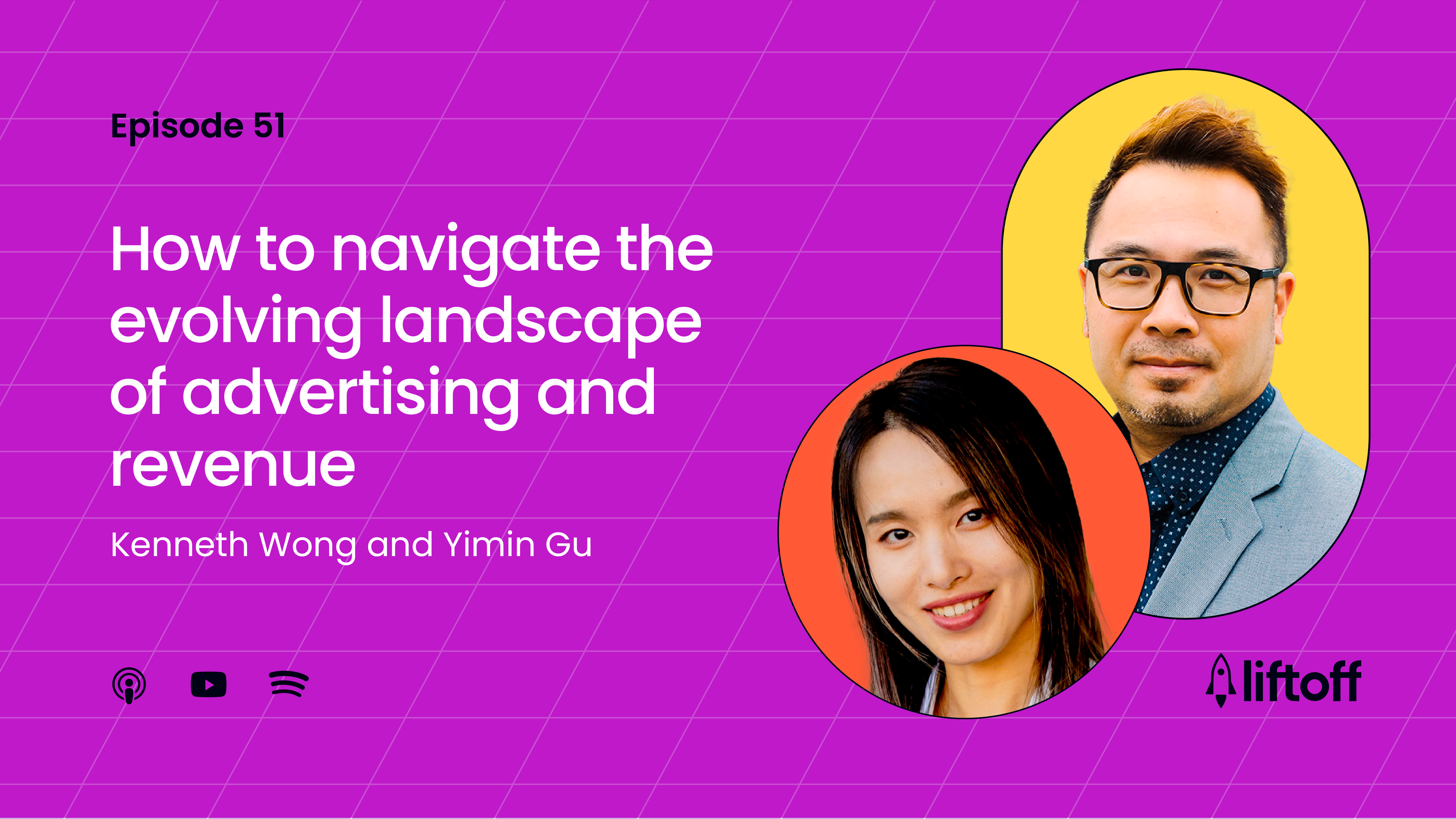Join us as we explore the latest trends, challenges, and innovations in mobile game design, advertising, and revenue generation. In this episode, we thoroughly examine the mobile gaming landscape, focusing on the constantly evolving dynamics of advertising and revenue with industry experts Kenneth Wong, Senior Director of Ads Revenue at Scopely, and Yimin Gu, Director of Performance Marketing at Scopely.
![]()
![]() Spotify, BuzzSprout, TuneInRadio, iHeartRadio
Spotify, BuzzSprout, TuneInRadio, iHeartRadio
– If you enjoy the episode, remember to hit subscribe!
We’ll discuss the constantly evolving dynamics of advertising and revenue, as well as the transformative impact of AI and user acquisition strategies.
You can also watch the episode on YouTube:
Topics we will cover in this episode:
- Introduction
- Challenges of user acquisition
- Challenges in user acquisition strategies
- Complexity of game-specific UA strategies
- AI in creative production processes
- Importance of brand enforcement
- Influencer marketing trends
- Transition and challenges in ad revenue
- Shifts in game development trends
- Addressing privacy concerns and user education
- The future of ads, privacy, and mobile UA
Read transcript
Introduction
[00:00:00] Jon Jordan: Hello and welcome to the mobile games playbook. Thanks for tuning in for another episode. This is a podcast all about what makes a great mobile game, what is and isn’t working for mobile game designers and all of the latest trends. I am your host, Jon Jordan, and joining me today, we have two experts who are gonna be talking about the, I guess, as I say, the two sides of the coin of mobile advertising. So we’ve got plenty to talk about, and we have Kenneth Wong, who is the senior director of ads revenue at Scopely. How’s it going, Kenneth?
[00:00:33] Kenneth Wong: Pretty good, nice to be on this podcast. So, I’m looking forward to chatting about all things industry-related.
[00:00:39] Jon: Good. And you’re on the ads revenue side of things. So, can you give us a little snapshot of what that entails?
[00:00:45] Kenneth: Yeah, so I manage the day-to-day operation for all the ad-related items for Scopely. So, we have all the different kinds of ad formats in our game. So there’s a lot of things, both in-house and external, in terms of communication that I manage, like partner relationships and internal partner relationships as well. So that’s a lot of things that we can go over in this podcast.
[00:01:13] Jon: Absolutely. Good, good. And I guess the other side of mobile ads is user acquisition. So, building out your audience. And talk about that, we have Yumin Gu, who’s the director of user acquisition. Let’s go, please. How’s it going, Yumin?
[00:00:37] Yimin Gu: Hi Jon, hi everybody. Hi, I’m Yimin, and I’m the director of Performance Marketing as we recently rebranded our team from User Acquisition. Yeah, so I’m leading the Performance Marketing team on the social side of the games for Scopely. Yeah, I’m super excited to be here and looking forward to chatting more about everything on the audience and growth side.[00:01:53] Jon: As you say, plenty to talk about. I mean, I think the mobile ads scene has been around for as long as the mobile gaming scene has been, but it seems to be from very much from an outsider’s perspective; it’s one of these things that is constantly changing. And I guess most people know it’s gone through some pretty big changes in the last two years. So, there is plenty to talk about there. But I guess as a very headline thing, you both work at Scopely. One of the, I guess, one of the most successful mobile games companies over the last 10 years, I think, very, very successful over the last decade and still growing fast with a big acquisition from Savvy Gaming announced. They’re still fairly recent. So, I guess the best is yet to come for Scopely, but we’re not talking about Scopely per se. We’re talking today about ideas of performance advertising and ad revenue. So, what do you want to break down? User acquisition has changed a lot recently. Where do you think we are at the moment? Where are the things you focus on at the moment that may be a bit different from what we saw a year ago?
Challenges of user acquisition
[00:04:07] Yimin: Yeah, well, I think the industry is just an ever or ever-constant changing evolving space. And with it, of course, UA strategies and channels are changing too. In my opinion, the UA landscape as a whole is adapting to two main shifts. One is the way people consume content. And two is how the advertising ecosystem changes. For the first part, for example, I think our audiences are more used to consuming content in different ways. Like they are watching short-form videos more and consuming influencer content a lot more than before as well. On our side, this has led to an expansion of marketing channels. I think a lot of the performance marketing teams are now leveraging more like influencer marketing or influencer performance marketing.
And another example, the way that people watch TV is also different now than before, right? Like, I think we used to be more watching linear TV, and now connected TV has become more predominant, especially with the younger demographics. CTV has now become more accessible and also a more versatile media platform. It’s also becoming a more leveraged media for performance advertisers. So yeah, I think more teams are just leveraging these emerging techniques like influencer marketing, like connected TV. Also, with all that, I think it requires tighter integration with internal brand teams’ communications to reach a broader audience, for sure.
And to my second point, with the change in the advertiser ecosystem, everybody knows about it. There have been so many changes around data privacy regulations, which has led to the rise of contextual advertising strategies that rely on content and user behavior more than personalized targeting. So, of course, more publishers are also trying to use AI and machine learning algorithms to optimize segmentation, predictive modeling, and campaign optimizations.
But yeah, overall, just to stay competitive in this industry, we just have to, I feel like, stay on top of all these new emerging trends and challenges. As of now, a lot of teams are taking advantage of new marketing channels and leveraging AI a lot more than before to acquire new users and drive success, but we’ll just have to be very adaptive in this market.
[00:07:32] Jon: I guess what you’re saying there is interesting because it’s the way I see things. Things were never simple, but definitely, before all the tracking stuff went. There was a general playbook everyone played against. I mean, whereas now you have, not only does that not work anymore, you have all these ever-increasing amounts of channels, and I guess the other thing is for you guys who have quite a wide range of genres that you’re trying to generate audiences for, then the thing that works for game A is probably, unless it’s exactly the same genre, it’s not gonna work for game B. So you have these multi-directional situations where everything’s changing, and that’s why stuff like AI machine learning comes into play because there’s no way that human beings could use that, deal with those amounts of variance in a logical way.
Challenges in user acquisition strategies
[00:08:42] Yimin: Yeah, for sure. I think because Scopely is structured, and different UA teams support different clusters of games. And, of course, we communicate so often to keep each other posted on the recent changes we’re seeing. But again, to your point, Jon, it’s impossible to share everything on a tiny basis and to adapt and adopt learnings from one another very, very frequently. So, for sure, leveraging AI is one of the solutions that we are adopting more than ever. I think it’s just an inevitable trend and a more efficient solution than ever before.
[00:08:33] Jon: I guess it’s interesting because the basic thing you’re trying to do is, you’re trying to get people to download your games. I mean, that’s the highlight. And I guess the highlight is that you’re trying to get the people who are going to play your games a lot and spend money on those games. I mean, that’s the headline. That’s what UA is about, isn’t it? That’s why you now call it performance marketing, I suppose because it’s the performance of you’re spending money on this end, the end of the flow, you want to have more money being generated. That’s basic business 101. But, so with that thing, how does that play across Scopely with all its games? As you say, there are different teams running different things.
Are there learnings that you can do across the whole portfolio, or does it break down very much into atomic learnings that worked really well for this channel for these months, and then you throw it away and start again? So you’re not too worried about having some logical system of how it works. You’re just looking at it, and it worked. Does that make sense as a question? I guess it plays into AI. I don’t know if this is the state you have at the moment, but you could imagine that in an AI or machine learning where the result is you put money in, and you get more money out, and you don’t really care what happens, or do you care what happens? Is that part, do you think of your expertise that there is that market knowledge that you have that can influence the system?
Complexity of game-specific UA strategies
[00:11:22] Yimin: Yeah, I think there are definitely things that can be applicable from one to another. But the reason that we now have to leverage AI more than ever is that we want to create more customized experiences for our audiences. Right? And we also want to create more cohesive experiences for our players. Our goal is not to just have them download the game. It’s as you said, play the game, engage with the game, and in the end, probably monetize in our game. To achieve that, we’ll have to make sure that our users have expectations when they see our ads. And then, when they land into the game, they see that the game actually achieved their expectation. And then they stay within the game, retain in the game. And continue engaging and monetizing in a game. That’s our goal.
And for that, we’ll have to do a lot more customization, which is for sure a lot of effort across different teams. We work so closely with our creative team. We work so closely with our product team, all that. So yeah, for sure. It is not just like once we do it and it can be applied to all strategies, it’s more like a catered and bespoke strategy per different gains.
[00:12:55] Jon: Yeah, I don’t know how much you can say about this, but I was reading an article a couple of months ago, and it was just about certain types of games and the amount of creativity they were generating was just like thousands and thousands of ads. I mean, it was just absolutely incredible now that the workflow required to create the ads to fit all these channels was always becoming like game development in of itself in just the amount of work that was required from art teams. And I guess, but I guess ALA solves that as well, does it? Or maybe it doesn’t, I don’t know.
AI in creative production processes
[00:13:35] Yimin: Yeah, I mean, I think generative AI is now also becoming a more leveraged tool in performance marketing as well. I’ve seen it being applied to a lot of creative production processes, especially with simpler assets like iterations adding voiceover or having some simple localisations. So it is, it definitely has provided a lot of value. But again, I think right now, it still needs a lot of more manual human input. For more complicated projects, I think we still need to rely on our internal creative team to produce the assets and cater for this more customized experience for our users.
[00:14:37] Jon: And I guess going back to AI solves it all, one thing that I could do if that was not bounded by your manual input is obviously you could come out with ads that were really successful or really successful in terms of driving audits, but they were not coherent to your game. And I guess in industry, there have always been people who have made up ads that had nothing to do with their game, which obviously works really well, but equally, that’s, I guess, from a reputation point of view, that’s not something that reputable companies like Scopely want to get involved with.
Importance of brand enforcement
[00:15:12] Yimin: Yeah, absolutely. I think we all know what type of ads you’re talking about, and we’ve probably seen them like a hundred times. That’s exactly why we still need to have human input into all this content. Having some core values and brand enforcement is definitely very important in all the messaging that we deliver to our audiences. So, for sure, as a UA team, we work closely with our brand team for a lot of the asset approval as well to make sure that we are following our brand guidelines to deliver the core values to our audiences.
[00:15:59] Jon: And one final thing on this point, you mentioned the influencers a few times, and I guess influencers, I don’t know, five or six years ago, when they first started coming in, we saw quite a lot of activity around that, but it seemed like in a lot of cases, it was not very, necessarily very sustainable, or it was quite hard to fit into the performance marketing flow because you talk back then at least when I was covering it you’d pay a 10 to 1000 dollars to someone to do a video about it and then they next week they do a video about something else and so it’s all quite hard to certainly be attributable. Have you found that the ecosystem is now more mature, and you can drive a sustainable audience through there? And because obviously there’s we always hear about these massive influences and on these channels bigger as ever, but I wonder now whether, so we have this situation where there’s a lot more, I guess there’s a lot more smaller influencers who may not give you scale, but if you can handle a lot of influences then that gives you a lot of scale in a more coherent way than maybe some of these very top-end expensive ones.
Influencer marketing trends
[00:17:17] Yimin: Yeah, I think whenever there is a new trend in the market, we need to give the audience some time to educate themselves. I think over the past few years, our audiences are now more used to watching those influencer-promoted content. Now, they understand more that this is how influencers make their lives. And as long as I think the promoted content is more smoothly embedded into their content, then I think it’s probably a much better advertisement to the audiences. In terms of attributing performance, I think there are still two different types of influencer campaigns that we run, one similar to what you just mentioned. OK, yeah, we pay them differently. The pricing model is more on cost per content. They are not really compelled by how many impressions they need to deliver, how many clicks they need to drive, and how many installs they need to drive. So we still view those campaigns more like brand awareness driven.
But there are also, I think, a lot of the industry professionals from the performance marketing side are now joining a lot of those influencer agencies and not only influencer agencies, but there are also teams from bigger companies that are now sectioned out to dedicated to performance marketing. And the campaigns that they offer are more achievable and more performance-driven. And with those, definitely, it is a much better-fitted type of campaign for performance marketing.
[00:19:28] Jon: I think that’s a good point. It does maybe certainly journalists are always thinking of things happening all at once. And as you point out, it does take a surprising amount of time for the audience to get educated on how these things work. And I guess for these industries to grow up and certainly when it comes to things like being able to attribute audiences to different influences, that does take much longer than we think.
Okay, that was good. That was a good overview of where we are on the performance side. Thank you, Yimin.
And Kenneth, you’ve been very, very patient there. Raring to go. So, you’re the other side of the coin. And I have to admit, that’s an area that I know less about. And I think it’s maybe an area that maybe has not been changing as dynamically. But what do I know about it?
[00:20:01] Kenneth: Oh no, no, I’m learning so much from Yimin.
[00:20:19] Jon: Tell me what’s been going on when it comes to driving revenue.
Transition and challenges in ad revenue
[00:20:24] Kenneth: Yeah, so like you already said, right, it’s the flip side of the coin. So whatever Yimin is faced with in terms of challenges, we are also facing the same thing. Primarily, the first, obviously, is privacy, right? Privacy is a lot like right now with Apple, with the IDFA we’re talking about, the industry averages around 25% ish in terms of people out of LAT.
So there’s a lot of people that we’re not able to talk to and serve targeted ads to. And it is a very chicken and egg thing, right? People are always like, hey, I don’t want to share my info. But at the same time, why are you showing this wealth of ads? And I was like, well, you can’t have it on both sides, right? So for us, it’s very difficult because they are complaining about wealth and user experience, about we’re not serving the right ads, but they’re not willing to pass the concept to us to serve them targeted ads. So I think that’s one key thing that hurts performance. Bidding, as we change into a model of bidding tech right now, most of the networks and partners we’re working with are heading that way. It’s really changed a lot of our operation, I guess, advantages of having any big team where we have the resources to dig into the data and optimize. And that really changes the landscape of where ad monetization is.
And then the other thing is about consolidation. Like in the last few years, there’s so much consolidation, so many M&As. Essentially, what it does is, if you think about the people in the auction house, you have fewer and fewer players. So you have fewer and fewer players who are willing to bid higher and higher to get the maximum performance and revenue for my side. So I think that’s another challenge.
Last but not least, Yimin talked about the shift in the performance marketing budget. So, a lot more money has gone to influencer CTV. Those will not get back to our pocket, like the publisher’s side pocket, right? So that also means that the pie might be, if it’s not growing, it’s standing still. So you add all these factors into it. We’re definitely not in the rosiest place. The huge growth that we’ve seen in five to six years is gone. So how, essentially, what we’re doing is keeping things afloat, and how do we look forward to the next big things that allow us to have the next growth, essentially?
[00:23:02] Jon: Hmm. Yeah. Has that influenced that slowing down? Do you think that has influenced the types of games, not maybe the sculpture making, but it’s all generally in the market? Obviously, if there’s a big growing way in which you can generate ads, money, or revenue from ads, developers are going to be like, right, let’s do more of those things. So do you think there’s been a switch more towards, right, let’s really focus down on in-app purchases, or is that just too obvious?
Shifts in game development trends
[00:23:32] Kenneth: Yeah, I always think so. Yeah, definitely, there’s just a shift in terms of, if you think about maybe three, four years ago, the rise of hyper-casual, right? And where the state of that genre is right now, it’s not dead because we still very much need hypercasual because it’s fueling the ecosystem. But at the same time, you see less and less, and it becomes more and more difficult. And that’s one of the reasons why that space might not be as, I guess, high growth as another genre. And there is always the preconceived notion that, at least for the developer side, it’s easier to convert people than to show them the ads because they are developers at heart, right? It’s like they want to make AAA titles. They want the user experience. They basically think ads are evil, ads are bad, like, you don’t wanna show any ads unless I have to, so I do think there is a trend. It is a common struggle with a lot of my friends in the industry as well to pitch ads internally as well.
[00:24:47] Jon: Mm-hmm. Do you think we’re talking about education around the ad model for influencers? Do you hold out any hope that education around gamers will mean that these opt-out rates change significantly? Or is that just yesterday’s model now? That’s gone now.
Addressing privacy concerns and user education
[00:25:08] Kenneth: Yeah, I would say so. I mean, we just have to find new ways to adopt these new rules, right? And I guess that’s the fun thing about being in this industry. You’re never at the plateau, like you always are, you’re never at a peak where the mountain is like, hey, I’m ready to retire. Like just sit still and just let things go. There are always new rules, new policies, new regulations that flow into the mix to make our job more difficult or more exciting. It depends on if you’re a half-full or a half-empty guy, right? So I think we’re adapting. We’re at the stage of how to get a new format into the game that talks about better user experience, less invasive, but at the same time is an additional source of revenue. I think there might be something on the horizon about that, but we’ll have to wait and see. Our industry sometimes doesn’t move as fast as I wanted to.
[00:26:02] Jon: But it’s in some ways ironic that the big battle that was won was incentivized ads in games, which, from all the data I saw, most gamers love those. They’d be like, can I have more ads? Because they give me the things that are in my game. And it’s ironic that the ability for gamers to love ads has now been taken away from them, and they get these ads they don’t want to see. And they’re not so valuable, so they don’t get the same incentives. It was absolutely, from your point of view, I’m sure it is absolutely the wrong thing to break on that.
The future of ads, privacy, and mobile UA
[00:26:35] Kenneth: Yeah, I mean, the fundamentals of the system, if you think about rewarded ads, opt-in ads, it’s still correct, right? It’s that the privacy itself, I think, goes back to platform education. I have discussed it with Google recently, and it’s like, hey, what are you guys going to do? Because soon they would follow Apple’s route in terms of removing the first-party data. So, like, are you gonna be as strict as Apple? Because that essentially is one of the reasons why my side of the coin is to have more challenges than ever before, right? It’s about if you look at the pop-up and say you have all these small tags, and then the next thing you see is ask the app not to track. Anyone who is not in our industry will click that button because it’s so obvious that you should not, and they’re not being specified what they’re tracking, not at least in a bold statement of, hey, we don’t care about who you are and where you live. We don’t know those things. We don’t know your banking information. We just want to serve you more reasonably, related to you. And that’s the experience that everyone wants. And I think that’s where it has to come from at the top, if you like, at the very top in terms of platform. If the platform does a good job in natural education, everyone within the ecosystem will benefit from it. So, of course, that’s bigger and easier said than done because they have a billion-dollar industry that is looking for a billion business today, and they need to run on it. So yeah, we’ll, we’ll see what happens, but I don’t think it’s the format itself, but more about the user education.
[00:28:09] Jon: Yeah. Good point. Well, as we come to the end, I guess I’ll ask both of you, Yimin, we’ll go for you first. What do you think in the next year or so, do you see, do you think there’s gonna be any sudden changes? Is there gonna be any step-by-step function going on there with something like AI coming in or, as much as anyone can see the future? How do you see that one playing out?
[00:28:46] Yimin: Yeah, I guess we’ve already touched a little bit, but the use of AI is definitely going to be more and more prevailing. We already are seeing it being used in creating advertising assets. And probably it’s also being used in, like, game art creation as well. Right? And I think as more companies are going multi-platform, there’s probably a growing effort to create unified user profiles across different devices and platforms while we still respect user privacy and everything. And I think AI is also probably going to be leveraged a lot in this whole process as well. The technologies have become more sophisticated, and they can already deliver more relevant content and ads, but I think in the future, it’s gonna get a little more advanced. And yeah, I think, as Kenneth mentioned earlier, we’ve seen a lot of M&As in the industry in the past years. Now, there are fewer but bigger players in the market.
And to this whole hit topic about more ethical and sustainable advertising practices, I think we need all stakeholders in the space to collaborate more and together, maybe we would be able to work towards establishing some better practices for user privacy and data management. Yeah, but like, I think it’s all my personal perspective into the future of mobile UA, but the industry is just so dynamic, and it can be influenced by a lot of unexpected events and new technical breakthroughs that we currently don’t know, right? So yeah, we’ll just have to stay adaptable and remain informed of the latest.
[00:31:20] Jon: It’s certainly interesting if there was, and I think there maybe is a long-term trend towards people owning their own data. And then that creates some interesting models about allowing you to track them and giving you their data for maybe in-game assets or something like that. And that maybe solves the interruption we’ve had at the moment with platforms breaking what was quite a good model. Kenneth, how do you see next year?
[00:31:49] Kenneth: Yeah, I mean, we’re definitely in the year of transition, right? So we’re definitely trying to understand what the new world is going to look like. I do believe that one of the formats I’m very interested in is in-game advertising. You see it a lot in terms of Netflix, right? Product placement is key to Netflix’s success. So, being in the amount of time people are spending in games, I’m still surprised at how it is not more, I guess, impactful in terms of mobile advertising in games.
But the good news is that there are more companies doing it now. I think it’s going to be on the rise. And I think that’s probably one of the better user experiences in terms of advertising that, hey, you get the brand in there, but then you’re still playing the game. You’re not exerting out. If anything, the user experience is probably the best. Right?
It goes to everything else about AI and privacy. And I agree Unified ID will be something very interesting. I hear some big platforms are thinking about in-game surveys, about things like what they can do in order to collect first-party data. And I think that’s the key, right? Collect as much first data as possible in the way that they play. How do we create a dynamic experience because of that? I think that’s another key point.
In terms of AI and ML, I think the machine learning part is more related to the UA side, but on AI for us, it’s definitely we are already using automated tools to help become more efficient in terms of a lot of the operational tasks, we automate it so that, we save time and use those time to do more like out on others things that might be, helping the business, right? In terms of thinking about A-B testing, thinking and segmentation, those are the things that are top of mind for us, for sure.
[00:33:50] Jon: So I guess that’s summarized that in the medium term, you get, or at least hopefully get, some optimisation boost from just this new technology. The AI stuff is clearly going to be important, but maybe in the long term as well, we hope that there’s going to be some more structural changes as everyone’s a gamer now. So I think, I think the nice thing is I think, people realized I’m giving my data to Facebook, and not only am I not getting anything from it, I’m getting ads or that data has been given out to people. I don’t want to have that data. Then that’s clearly one thing. But if it’s like I’m playing a game that I love and it’s not really my personal data, it’s my gaming data. And if I’m getting more stuff in the game that I love from doing that, then I think that’s a very different dynamic. So maybe, hopefully, in the long term, games will become more valuable for advertisers because it’s not your real-world data in the same way it is for these other products.
[00:34:47] Kenneth: Exactly, exactly. It’s a virtual world of data, for sure.
[00:34:51] Jon: There we go, that’s the hopeful future. Well, thank you very much to Kenneth and Yimin for their expertise and for helping us try and unpick some of these interesting dynamics that are going on in space. Thanks for your time.
[00:35:04] Kenneth: Well, thanks for having us.
[00:35:06] Yimin: Thank you for hosting us, Jon.
[00:35:08] Jon: And thanks to you for watching and listening to the podcast, or however you are consuming it. Every episode, we talk to people who are deep into the mobile games industry, the largest single part of the games industry and one that is reaching billions and billions of people and is really fascinating in terms of all the dynamics and what’s going on. So please subscribe to the podcast, and I’ll see you next time. See you then, bye-bye.






















